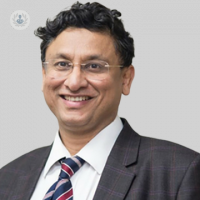Understanding breast lumps
Written by:Each year, more than 50,000 women are diagnosed with breast cancer in the UK.
Professor Jayant Vaidya, renowned consultant oncoplastic breast surgeon and professor of surgery, emphasizes the importance of early detection of breast cancer to discover any changes in the breast.

Why is early detection of causes of breast lumps important for breast health?
It’s important for women to be aware of how their breast feels.
When you shower, soon after your period, it’s important to carefully perform a breast self-examination to see if there’s anything different. It’s also important to raise your arms and bend forward, and look at your breast in the mirror for any dimpling of skin, which can be a very early sign of cancer.
In the UK, the risk of developing breast cancer between the ages of 40 to 50 is about 1% – 2%. However, when it develops, breast cancer has a big impact.
More women are aware nowadays. In the 1990s, 1 in 10 women at a breast clinic were diagnosed with breast cancer. Today, 1 in 30 women that we see at a breast clinic are diagnosed.
How do the different types of breast lumps differ?
Most breast lumps in young women are benign, like fibroadenomas or breast cysts. Malignant breast lumps, however, have particular characteristics.
For this reason, it’s important for clinicians to get to know their patient first, take full and detailed medical history about everything that relates to breast cancer, perform a thorough physical examination in good light, and feel the breast in a careful manner.
If a breast lump feels tender and it suddenly appeared overnight, then it’s likely to be a cyst. If a breast lump is moving substantially within the breast, particularly in women under the age of 35, then it’s likely to be a fibroadenoma.
If a breast lump is slowly growing or – if you suddenly discovered the lump – it’s firm to hard and it causes a dimpling of skin over the lump, then it’s likely to be suspicious.
Nipple discharge from a single duct is something that needs to be very carefully looked at, especially if it’s bloody. Not always is it, though, a sign of cancer.
What are the key techniques when performing a breast self-examination?
You should feel your breast with a flat hand, using the pads of your fingers as they are more sensitive. Sometimes, breast tissue can feel like a lump. However, if the lump and the edges of the lump are still felt with the edge of your hand, then it’s likely to be a lump.
However, I believe it isn’t very correct for women to differentiate and diagnose breast cancer based on a breast self-examination alone. Instead, it’s best to undergo a specialised triple assessment, involving:
- Medical history and clinical examination
- Diagnostic imaging with an ultrasound, mammogram, and MRI sometimes
- Tissue diagnosis with a needle biopsy
These are the three legs based on which the diagnosis of any breast lesion is made.
Navigating breast lumps treatments, how can patients access reliable information and support during their breast health journey?
When you go to a breast clinic, your consultant should be able to give you information that is relevant to you in your own language. Your breast care nurses should then explain, in even more detail, how you can take care of yourself, including the social aspects and the emotional aspects of daily life.
Furthermore, there are many good charities like Breast Cancer Now with helpful booklets that can be downloaded.
To schedule an appointment with Professor Jayant Vaidya, head on over to his Top Doctors profile today.


